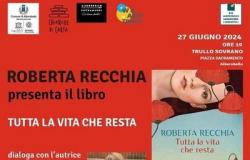“Metamorphic instability” (p.47) and then, also, “treacherous transitability of forms” (p.101). These seem to be the characterizing elements in the story, told in the first person by an anonymous narrator, of Michele Mari’s new novel, Locus desperatus, Einaudi 2024. It is a neurotic ego, of an absolute neurosis, which is constantly a prisoner of the various protective rituals which its neurosis feeds on to limit itself. But they are not enough, also because one sad morning he discovers the sign of the cross on his front door, drawn by an equally anonymous hand. Disorientation and destabilization take possession of him. Who marked his door? What does that sign, or rather, THE sign, mean? Does it involve a saving election or destruction?
He soon finds out what’s going on, or so he thinks.
A certain group of mysterious characters simply want him to move out of his house, a house museum, crammed with things and books, to replace him and take over from him.
But even the adherents of this enigmatic sect suffer from the same continuous mutability that defines everything that happens in the course of the story. The first of these has a singular name, Asphragistus. As if to say that he is not sealed, if it is true that, in Greek, sphragis indicates the seal. And in fact he, who is the first to reveal the group’s occupying aims to the narrator, when he reappears on the scene later, denies being himself, literally calling himself an “asshole” (i.e. saying “Asphragistus is an idiot”), but then a revealing detail irreparably credits his denied identity to him: he is fond of sambuca, exactly like Asfragisto (since he is Asfragisto). Another member of the sect, Procopius, a false Latinist, also appears first in the role of a beggar doubled over by illness and pain, only to reappear on stage at a later moment as an elegant man with a casually erect bearing.
Generally, encounters with these sinister figures take place in infamous bars, run by equally changeable or mutant bartenders.
Even the narrator’s classmates, even his (deceased) mother and old friends suffer the same fate, to the point that he does not hesitate to believe them to be body snatchers like those in the well-known Don Siegel film. The dimension of the body snatcher, as can be seen from the mother’s case, no longer concerns only the present, but has also extended to the past. Which is as metamorphic as and more than today. Even the books in the narrator’s library lose the compactness of their pages, the characters mix, the stories become confused, as if the body snatchers were sucking the memory of the narrator. Moving books to a second lakeside home or a neighboring apartment doesn’t do much good.
He himself, of course, ends up doubling himself and sees and feels his sad separate existence, as Laura Mars saw herself in the equally well-known film.
Not all characters are adverse to the narrator. A precious helper who also has extra-sensory powers turns out to be Silenus, the slug-man who feeds on acetone and trichlorethylene and the like. But, as we understand, he is certainly not a champion of stability, this shapeless mass that leaves a trail like tar wherever it passes.
But the strongest defense, in the face of this attack by such subtle and intrusive or invasive enemies, seems to be that of culture. The narrator is supported by a bookish defense, made up of continuous quotations, which range from obvious foscolisms and Danteisms (“I am not who I was, a large part of us perished”, “little prayer”) to Machiavelli’s letter to Vettori (“condecently dressed in curial clothes”), from obsolete Latinisms such as “scelo” or “rore” to the archaic Italian of terms such as “niego”. Not only that: the continuous reference to texts, films, topical situations of high or pop culture seems to obey the need to show an always active memory, a brain that does not stop functioning despite repeated attempts at foreign colonization. To the point that even the story of the cross on the door (a cross that is continually remade despite the erasures) is in a certain sense philologised. That cross is traced back to the “crux desperationis” or obelus, a sign that the Alexandrian philologists placed next to passages that could not be amended, whose meaning and letter remained unsolved and insoluble. The narrator’s house therefore finally reveals itself to him as an authentic “locus desperatus”. Moreover, even before this dazzling intuition, to talk about his unrecognizable classmates, he had evoked the “adiaphore chaos of reversibility”, where it should be known that the undecidable variants are called “adiaphores”, again in the critical edition. , each theoretically admissible but not exclusively. And then, again, shortly after, and again for these classmates of his who seemed to belong to two parallel and only partially overlapping classes, another technical term of ecdotics is called into question, namely “contaminatio”. Faced with the chaos of existence, faced with the absurd, the narrator stubbornly relies on the rationality of philology. He philologizes the monstrous and the grotesque. He resists.
His has always been “a life in defense” (p.99), an interstitial life, lived “in the interstices of things” (p.95), a life “delegated to things and books” and this situation of emergency only accentuates and exalts this habitual tendency to the maximum power.
And so things will be, his disparate objects, his collections, as well as his books, all elements with which he not only spends time but with which he speaks and confides and deliberates, these will be objects imbued with psyche, now become subjects , to stand as a bulwark of the house and their lord-captain-subordinate, but I will not reveal the precise way. See the reader.
The conclusion, however, seems to be marked by positivity.
The whole book can also be described as an enormous Ringkomposition, as classical philologists say, an annular composition: on the first and last page the narrator performs the ritual gesture par excellence, closing the door of the house with a complex of eleven different operations: with the decisive and very significant difference that at the beginning the door is actually closed, at the end the closing gesture is only mimed.
For the rest, even in these pages as in many others by the same author we note influences of Manganelli (where the protagonist is presented as a king or an absolute monarch of his domestic environment), of Landolfi (the meeting with the expanded classmate who secretes colostrum, as well as the various “al certain”, “al tutto”, “alle ugly”, minor landolfisms) and of Gadda, for example in the frequency of the fusion of nouns, as in the abnormal “neo-leek -bubo-spider of Asfragistus”, or in the productivity of the suffix -izzato, for example in “procopizzato” and others.
It goes without saying that in this thick, dense book, full of objects, the rhetorical procedure that reigns supreme is enumeration, and specifically, that particular case of enumeration that Leo Spitzer called “chaotic” which can be exemplified with this on p.89: “a shot glass in cut crystal; a pewter stoup; an Asterix album (Asterix and the golden sickle); a bicycle pump; a billhook; a magnifying glass with an ivory handle; a blank diary from 1969; a spring-loaded table pinball machine, an enamelled iron jug”.
Overall, the entire book seems to be configured as an apotropaic-talismanic object, or as a spell, a very successful one indeed.





